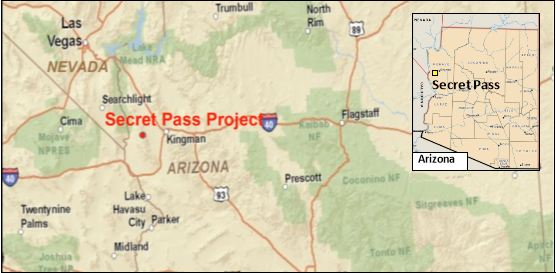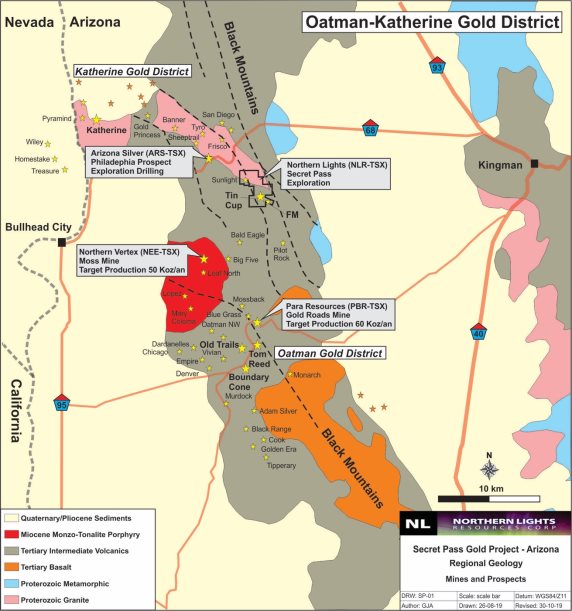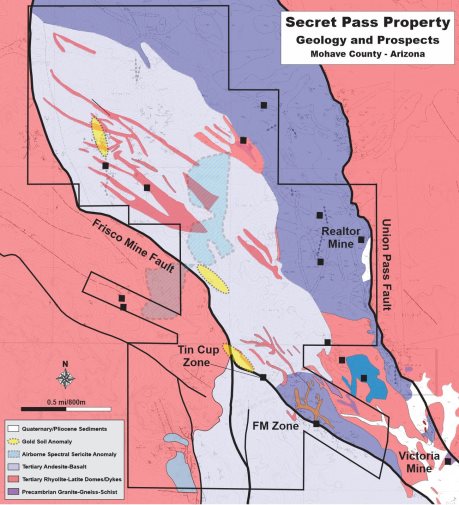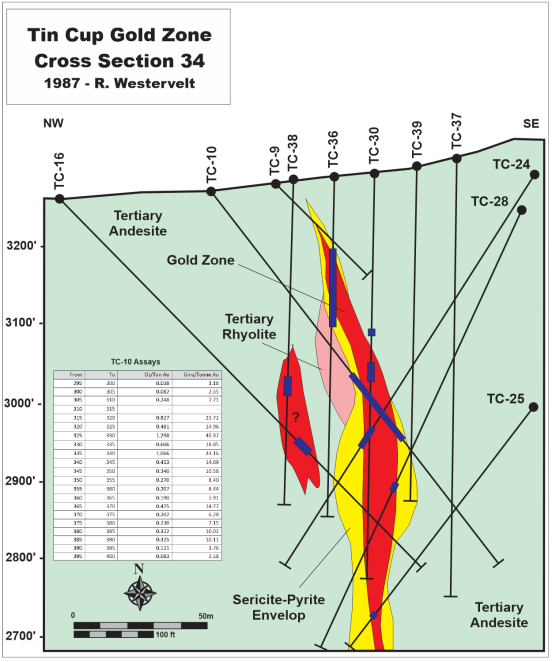
Northern
Lights Completes
Cash Payments
for 100%
Acquisition
of the Secret Pass
Gold Project
Vancouver, British Columbia, Canada -- November
7,
2019 -- InvestorsHub NewsWire -- CSE Symbol: NLR Northern
Lights Resources Corp. (the "Company"
or "Northern
Lights") is pleased to announce
that it has
completed
the
cash consideration
payments required to complete the 100% acquisition of
the
Secret Pass
Gold Project
("Project")
located in Mohave County, northwestern
Arizona (the
"Transaction")
as shown on
Figure
1.

Figure 1:
Location Map Secret Pass Gold Project
Northern Lights has
completed cash payments to the Project vendors totaling
US$350,000 as defined under the definitive purchase
agreement for the Transaction announced by the Company on
July 15,
2019. Within
30 days, the Company will issue
2,000,000 common shares to the Project vendors and complete other
administrative arrangements required to complete the Transaction.
Upon
completion of the Transaction, Northern Lights will own 100% of the
Secret Pass Gold
Project.
There are no third party royalties
payable on
future production from the Project.
The Secret Pass Gold Project
1)
The
Oatman-Katherine
Gold District – A
Prolific
Historic Gold Mining District
As illustrated
on Figure
2,
the Secret
Pass Project is located in the famous historic Oatman-Katherine Gold District
of
northwestern
Arizona, close to the Nevada
and
California
State
borders. The Oatman-Katherine Gold
District was
established in 1863 and historically is Arizona's third largest
gold producing area. Between 1863 and
1940 it
is estimated the district produced
over two million
ounces of gold and one million ounces of
silver. The district includes many
historic mines and workings with over 80 separate
mines reporting production.

Figure 2:
Oatman-Katherine Gold District,
Arizona
More
recently, there has been a significant
increase in exploration and mining activity in the Oatman –
Katherine District. Current operating mines in the
area include the Moss mine owned by Northern
Vertex Corp., an open pit
heap leach
operation that reached commercial production in September
2018, and
Para Resources Inc. that reported starting underground production at its Gold Roads
Project in February 2019.
Secret Pass
consists of 84 unpatented lode mining claims comprising 655.6
hectares (1,620 acres) of claims under the administration of the US
Bureau of Land Management ("BLM") and 212.4 hectares (524.9 acres)
for a total of 868 hectares (2,145 acres).
2)
Geology,
Previous
Production and Exploration Work
The main structural
feature in the region is an imbricated system of shallow to steeply
dipping faults that trend north-northwest.
With reference
to Figure
2 this fault system has been traced
for approximately
65 km extending from the Oatman
District in the south, through the Secret
Pass-Frisco
Mine area,
into the Katherine Gold
District. As illustrated on
Figure
3,
two
regional
structures, the Union Pass
and the Frisco Mine
faults, transect the Secret Pass property.

Figure 3:
Secret Pass Project Geology and Historic Mine Workings
Numerous gold
showings and prospects are associated with the Union Pass and
Frisco Mine faults, and some have reported limited
gold
production.
The Oatman District is located approximately 13 km
south of Secret
Pass property, and has produced over two
million ounces of gold.
Mining
records
indicate that there are 15 historic mine
workings
located in
the Secret
Pass license area. The Tin Cup and the FM gold prospects
were extensively
explored and drilled by Santa Fe Mining and Fischer-Watt from 1984
to 1991. A
total of 14,000 metres of drilling was completed in
126 holes including 114 reverse circulation and 12 core
holes.
The
Tin Cup Gold
Zone is localized along the steeply
northeast-dipping Frisco Mine
Fault. The gold mineralization
is hosted by
Tertiary andesite
and associated with the margins of rhyolite dykes that occur as lenses within the
Frisco Mine Fault. A few of the deepest
drill holes intersect gold
mineralization
in
the Proterozoic
basement granite.
The mineralized
zone has a strike length of approximately 245 metres and a drill-indicated depth of
up to 180 metres, both open along strike and
depth.
High-grade mineralization greater than
3 g/t
Au, is localized in a 3.0
to
7.6
metres
wide,
steeply northeast-dipping structure that occurs within a much wider mineralized fault
zone that ranges from 30 to 45 metres in width. The mineralization has
a northwest plunge and is considered to be open at
depth. Surface oxidation extends to a depth of up to
approximately
120 metres.
The
FM Gold
Zone is
also controlled by the northwest-trending Frisco Mine
Fault
that dips steeply to the southwest. Gold mineralization at
the FM zone is hosted exclusively by granite and rhyolite
and has
a strike length of
approximately 200 metres and extends to a depth of up
to 120 metres, open along strike and
depth.
The zone of
mineralization ranges from 13 to 30 metres in width at the surface and then
transitions into distinct 3.0 to 8.0 meter near-vertical, low-grade
(<1.5 g/t
Au)
structures at depth. Depth of oxidation is variable but is
generally extends to a depth
of
75
to
100
metres.
Two
geological
models have been
proposed for the Secret Pass gold
mineralization. The first
model
is the epithermal
bonanza style veining and hanging wall
stockwork
setting, with gold mineralization the
result of repeated boiling events. This style of
mineralization
is prevalent in
the Oatman Gold District. The second
model
is a low-angle
detachment fault setting, with gold deposition
occurring at an oxidation-reduction boundary. This style of
mineralization is present in the Katherine Gold
District located approximately
15
km
to
northwest of the Secret Pass Gold Project.
Tin Cup
Mine
The Tin Cup
mine
reportedly produced several hundred tons of mineralized material
grading 15 g/t (0.5
oz/t) to 31 g/t (1 oz/t) of gold. Historic workings from the 1930's
included an open pit and an inclined shaft
to a depth of 21 metres (70 ft) with minor
underground level
workings. There has been no known production from the Tin Cup Mine
since the 1930's.
During
the period from 1984 to 1991 drilling program, significant gold mineralization was intersected
in a number of holes in the Tin Cup Gold Zone.
As illustrated
in Figure
4,
gold assays ranging as high as 40 g/t Au over significant
widths at
depths ranging from 30 to 180 metres below
surface.
These
results are
historical in nature and a qualified person has
not done sufficient
work to verify these
previous
drilling
intersections.

Figure
4: Historical
Cross Section of Tin Cup Gold Zone
(Modified
from Arrowstar
Resources
NI 43 -
101 Report, May 4,
2016. Note this
information is historical and has not been verified by a qualified
person under the guidelines of NI 43-101)
In summary,
the Secret
Pass property is transected by two
major gold bearing regional structures, the Frisco
Mine
and Union Pass
faults. These faults have combined strike
length in excess of 13 km on the
property. The last exploration program
was completed on the Secret Pass property was in 1991 and was
entirely focused on the Tin Cup and FM gold zones
which accounts for
less than 10% of the total license
area. Only
the area between Tin Cup and FM gold zones has been drill
tested over a strike length of 1.2 km. and very limited surface
exploration was conducted on the structures located outside of Tin
Cup and FM gold zones.
3)
Proposed
Exploration Program.
Upon completion of
the Transaction, Northern Lights' initial goal for the project
will be to generate a NI43-101 compliant resource estimate
for the Tin Cup
Zone and to
establish additional exploration targets.
The
initial
exploration program
for the Secret Pass Gold Project will be conducted
in two phases with Phase 1 focused on the
review of historic drilling and resource information at the Tin
Cup/Fm Zones plus the completion of
additional background exploration work for the Project.
Phase 1
Exploration
Program –
Historic Data Compilation / 3D Modeling / Exploration
-
Evaluation and
compilation of historic drilling and surface geology into a modern
digital format to be used in the GIS and geological
modeling.
-
Completion of drone
aeromagnetic survey over the Tin Cup and FM Zones.
-
Geochemical
sampling
over target areas
to include multiple element
as well as
low-level gold background survey.
For areas of
anomalous gold results, additional samples will be taken to determine the
extent of a halo of gold mineralization.
-
Geological mapping
to identify structure and alteration to extend known
mineralization.
-
Three-dimensional
modeling of
historical data and aeromagnetic survey results to
allow Northern
Lights to refine the Phase 2 exploration targets
and confirm
the historical surface and underground
mineralization at Tin Cup for mine planning
purposes.
The Phase 1
exploration program has an estimated cost of US$150,000 and will be
used to refine the Phase 2 Exploration Program that will include
targeting
exploration drilling program required to establish a
NI43-101
resource at the Tin Cup/Fm Zones as well as to test
additional
exploration targets identified by the Phase 1 Exploration
Program.
The scientific and
technical data contained in this news release was reviewed and
approved by Gary Artmont
(Fellow
Member AUSIMM
#312718),
Head of Geology and qualified person to Northern
Lights Resources, who is responsible for
ensuring that the
geologic information provided in this news release is accurate and
who acts as a "qualified person" under
National Instrument 43-101 Standards of Disclosure for Mineral
Projects.
For further
information, please contact:
Albert
Timcke, Executive Chairman and President
Email:
rtimcke@northernlightsresources.com
Tel: +1 604 608
6163
Or
Jason
Bahnsen, Chief Executive Officer
Email:
Jason@northernlightsresources.com
Tel: +1 604 608
6163
About
Northern Lights Resources Corp.
Northern Lights
Resources Corp is a growth oriented exploration and development
company that is advancing the Medicine Springs Project located in
Nevada. Northern Lights is earning a
100% equity
interest in the Medicine Springs Project, a prospective silver –
zinc – lead property located in southeastern Elko County,
Nevada.
Northern Lights
Resources trades under the ticker of "NLR" on the CSE. This and other Northern Lights
Resources news releases can be viewed at
www.sedar.com and
www.northernlightsresources.com.
CAUTIONARY
STATEMENT REGARDING FORWARD-LOOKING
INFORMATION:
This news release includes certain "forward-looking statements"
under applicable Canadian securities legislation.
Forward-looking statements include, but are not limited to,
statements with respect to: the terms and conditions of the
proposed private placement; use of funds; the business and
operations of the Company after the proposed closing of the
Offering. Forward-looking statements are necessarily based
upon a number of estimates and assumptions that, while considered
reasonable, are subject to known and unknown risks, uncertainties,
and other factors which may cause the actual results and future
events to differ materially from those expressed or implied by such
forward-looking statements. Such factors include, but are not
limited to: general business, economic, competitive, political and
social uncertainties; delay or failure to receive board,
shareholder or regulatory approvals; and the uncertainties
surrounding the mineral exploration industry. There can be no
assurance that such statements will prove to be accurate, as actual
results and future events could differ materially from those
anticipated in such statements. Accordingly, readers should not
place undue reliance on forward looking statements. The
Company disclaims any intention or obligation to update or revise
any forward-looking statements, whether as a result of new
information, future events or otherwise, except as required by
law.
Northern Lights Resources (CSE:NLR)
Gráfico Histórico do Ativo
De Dez 2024 até Jan 2025

Northern Lights Resources (CSE:NLR)
Gráfico Histórico do Ativo
De Jan 2024 até Jan 2025
